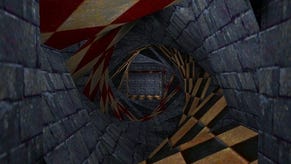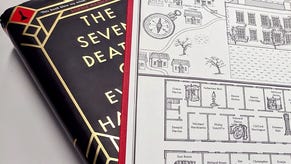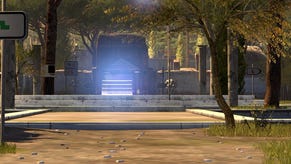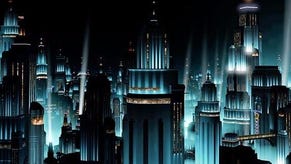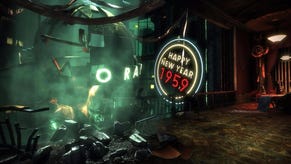BioShock 2
Would you very kindly?
It raises an obvious question. Given what Ayn Rand's novel Atlas Shrugged meant to BioShock, what's the equivalent here? Thomas deflects. "If I told you what the influences to the motives of our characters are right now, it would spoil a lot about the plot," he says. "This isn't time for that yet. I will say that I find characters, whether they're heroes or villains, as ideologues very compelling, and you have to kind of know the material before you can write somebody like that and have it resonate in any way, and everyone on BioShock 1 had a bellyful of Rand... There was a lot of, 'Oh my god, if she mentions another sharp angular face again I'm going to strangle myself.' Well, in BioShock 2, we are doing similar research, I just can't say on what yet."
With Thomas's background in horror - designing The Cradle in Thief 3, and Fort Frolic in the first BioShock - that side of the game is also amplified. "Because you play this sort of armoured prototype who's pretty much designed to survive, I kind of have to strike the player obliquely on the fear front," he says. "I have to wage psychological warfare against the player."
"I think BioShock 1 was very much a tragedy - the horror of loss, and of exposure to the dysmorphic effects of these characters who have been distorted by ADAM - and in BioShock 2, I hope there will be a horror of emotional context as well, that I can cause you to experience massive cognitive dissonance from time to time and keep you guessing. That's at the very least my goal. I think fear is very important to BioShock, as is tragedy, and it's toeing the line between those two that is both what makes the challenge compelling and BioShock unique."
Thomas says that BioShock 2 "validates all possible choices the player could have made" at the end of its predecessor, and there's a consensus about choice within the game. "The kind of levels that we want to put you in are more about the old Warren Spector/Looking Glass dichotomy of problems rather than puzzles," says lead level designer JP LeBreton. "Puzzles have an explicit hard-wired number of designer-intended solutions, and for the most part we want to put a lot of different tools in the environment and the player's hands."
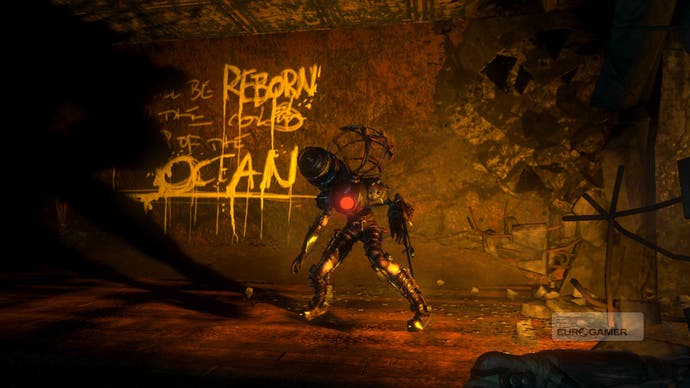
On a purely mechanical and structural level, this will mean a return to the mixture of map-based exploration and genetic augmentation, although the team will only discuss the way the game plays out in generalities, promising stronger FPS fundamentals and things like that. You will get to splice yourself silly again, for example, but we aren't told much about how the combat has changed, except to say you can now dual-wield weapons and plasmids. We're also promised online multiplayer, but nobody will say what that entails.
Throughout the time I spend in Marin, the narrow parameters of the discussion are a stumbling block. But in a sense this is also encouraging: it was the nature of BioShock that every answer generated a dozen more questions. Even months after the game was released, the debate surged back and forth about the significance of details and design choices. The fact that fifteen minutes of BioShock 2 gameplay and two hours of interviews leave so much open to interpretation (the butterfly in the trailer, for instance) is the game's most important, and promising, characteristic.
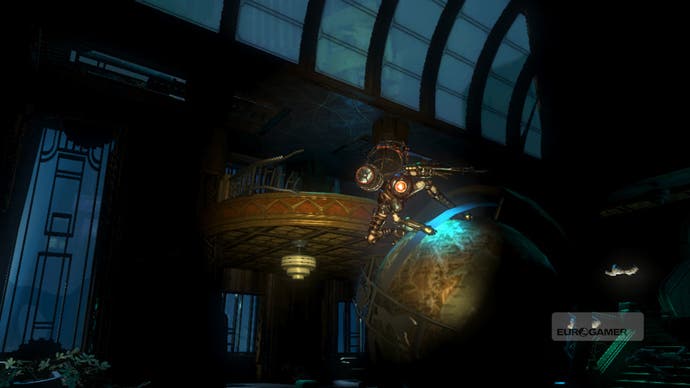
"I am very interested in systems of play as kind of gardens in which you can plant the seed of a question and allow the player to shape how the thing grows," says Jordan Thomas, explaining his ambitions. "And specifically, that doesn't really work unless your mechanics are very unified with the kind of story you're telling, and so I am striving, shall we say [he grins], to generate a similar resonance from the sort of the high themes all the way down to the base mechanics.
"I can't really say how, because it would be a giant ass spoiler, but it is important to me that BioShock 2 is worthy of the name - not just as narrative, and not just as a kind of series of meaningful player decisions, but also particularly as a videogame that asks interesting questions, and from which players can derive meaningful statements."
In other words, you may be a Big Daddy, but they get what that means.
BioShock 2 is due out for Xbox 360, PS3 and PC this autumn. Check out the Editor's blog to see what else the developers had to say.


